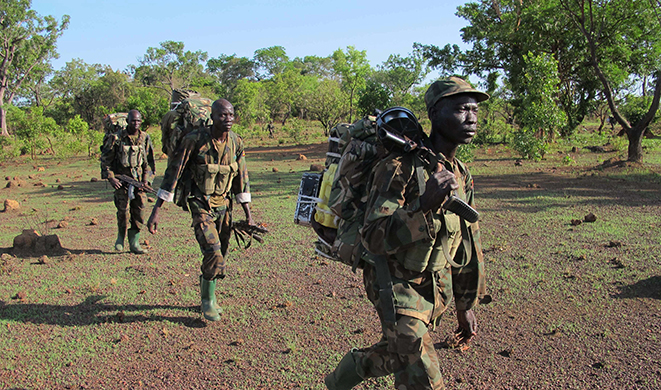
Editor's Note: This op-ed, written by LRA field researcher Kasper Agger, originally appeared on Christian Science Monitor.
KAMPALA, UGANDA — "American, American, American" a group of enthusiastic children shout at a group of US troops at a dusty roadside in Obo. The once sleepy village in the southeastern corner of the Central African Republic (CAR) is now a logistical hub for joint US-Ugandan operations against Joseph Kony’s Lord’s Resistance Army (LRA) rebel group.
The more-than-two-decades-old rebel group is known for its use of child soldiers to fill the ranks. More than 4,500 people have been abducted by the group since December 2008, and at least 2,300 civilians were killed over the same period. The United Nations estimates that 350,000 civilians have been displaced across central Africa because of LRA atrocities.
The excitement of the children I saw in Odo reflects new optimism among locals – and a renewed sense of safety. The arrival of U.S.Special Forces has had a game-changing impact on the counter-LRA efforts. Their presence provides real hope for ending the rebel group and providing a brighter future for the thousands of people that suffer because of weekly attacks and lootings from the rebels. Local religious and traditional leaders have appealed to US advisers to stay, saying their security has improved. The Obama administration must heed this appeal and ensure that the advisers remain deployed until the senior leadership of the LRA has been removed.
A team of approximately 100 US military advisers was sent to central Africa in late 2011 to help African forces – mainly Ugandan – dismantle the LRA. The US advisers are based in field locations in South Sudan, the Central African Republic, the Democratic Republic of Congo (DRC), and at a tactical headquarter in Uganda. The advisers are combat-equipped but only authorized to use lethal force in self-defense. They rely on partner forces to fight the LRA, and the counter-LRA campaign has yielded measurable progress.
The LRA faces mounting pressure, and is weaker than ever before. Attacks are down by 53 percent since the advisers’ deployment, and LRA killings decreased 67 percent from 2011 to 2012. Reports estimate that only 200 – 300 fighters remain with the group and operate in the border region between CAR, South Sudan, and the Democratic Republic of Congo.
By contrast, regional counter-LRA military forces are growing stronger. The US advisers have provided hands-on military training for regional troops and have improved their jungle-tracking capabilities, intelligence gathering, and capacity to protect civilians.

